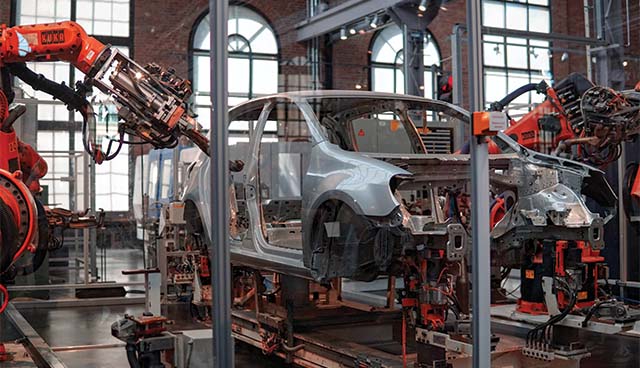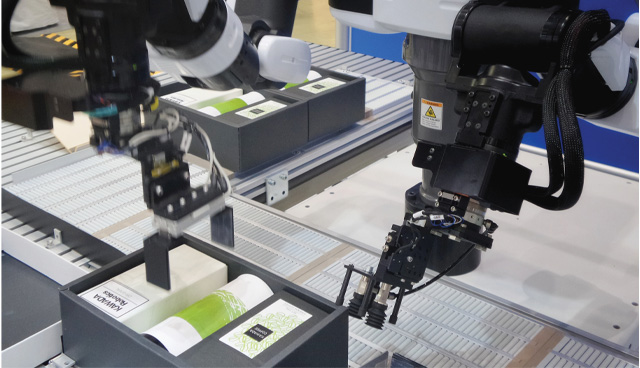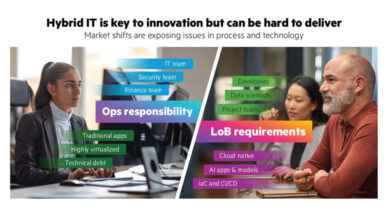Digital automation and the future of work

Published at the request of the Panel for the Future of Science and Technology (STOA) and managed by the Parliamentary Research Services (EPRS) of the European Parliament, the Digital Automation and the Future of Work report considers the impact of digital automation on job quality and associated risks and benefits.
Described variously as the Second Machine Age, the Fourth Industrial Revolution and Industry 4.0, across European economies, the digital revolution is inspiring intense technological progress, particularly in artificial intelligence (AI) and advanced robotics. It is projected that these advances will transform how work is undertaken. For instance, the digital revolution has the potential to simultaneously reduce the volume of work and enhance the quality of work.
Written amid the Covid-19 pandemic, Digital Automation and the Future of Work, the catalytic effect of the crisis is evident, for instance in the widespread adoption of digital technologies for remote working. The pandemic has also exposed gaping societal inequalities as the poorest and youngest bear the brunt of the economic fallout. As such, the policy proposals contained in the report are relevant to the forthcoming recovery.
Having “systematically and critically reviewed key literature on digital technologies”, the report outlines several policy options, ranging from industry and sectoral skills alliances to proposals for reduced working hours, whereby technology is harnessed to deliver positive socioeconomic outcomes.
Advocating for a new digital social contract, the report indicates that its policy proposals are informed by the aim of managing digital automation via “principles of industrial democracy and social partnership”. Overall, these proposals are intended to “offer hope for a new digital future that works for all”.
Digital automation is reliant on investment, wages, and the current regulatory environment. This means its scale and depth is difficult to define and “technological change, as in the past, remains uncertain and open to reform”.
Precedence illustrates the resilience of work, in spite of historical technological progress. Given the limits of automation and the capacity for technological change tasks within jobs, it is fair to project that future developments will preserve work. Meanwhile, the report contends that digital surveillance can limit worker autonomy and hinder the quality of work.
The report consistently emphasises that technological progress will unlock opportunities as well as risks. For instance, digital technologies can create a context within which working hours decrease and living standards are augmented. Likewise, workers can be upskilled amid a general improvement in job quality.
Conversely, digital technologies can foster skills gaps, exacerbating inequality and further polarising society. Similarly, job quality can be eroded through the nullification of valuable skills, intensified monitoring in the workplace and the proliferation of atypical work.

Consequently, the Digital Automation and the Future of Work seeks to contribute to policy discussions seeking to maximise the benefits and minimise the risks associated with digital technologies.
The report asserts that rather than being deterministic, technological change can be moulded. There is, it indicates, “no guarantee that digital technologies will destroy jobs, nor any certainty that these technologies will lead to more and better jobs”. Instead, societies must make decisions on which technologies they develop and implement. Ultimately, the report states, “society must aim for a digital future where the greatest number of people thrive within work and beyond it”.
While some authors of the report perceive robots to be the workers of the future, others suggest that as in the past, the impact of technological change will be most discernible in quality of work, rather than volume and, as such, major job losses will be avoided.
Cognisant of the myriad impacts technological change has on work and employment, the report outlines that its net impact is relative to potency of the job displacement effect. However, job losses are not necessarily predetermined by technological advancement and there is potential for increases in paid employment.
Simultaneously, technology can impact the very nature and quality of work. How tasks are allocated, and work is completed is reliant on the technology that is developed and adopted. This is linked with the broader socioeconomic context, including ownership and control of technologies. As such, while job quality and skills can increase, deskilling and the embedding of low paid, low autonomy work can also prevail.
“It is hoped that policymakers will take note of the policy options and that the report will help to spark wider critical reflection on the possibilities for rethinking technologies and work in the future,” it suggests.
Suggested policy options
Acknowledging the ongoing and projected impact of digital automation on the labour market and workplace, the Digital Automation and the Future of Work report outlines several policy options. While some are analogous to existing policies, others are more innovative. These are divided across five categories.
- Skills and training provision
Industry and sectoral skills alliances centred on assisting transitions for workers in ‘at risk’ sectors.
Reskilling workers in transformed jobs.
Digital upskilling for AI-enabled ecosystems.
Additional protections for workers in jobs that are less likely to be automated. - Digital work/life balance
Establishing a European right to disconnect.
Reducing the EU Working-Time Directive to 38 hours per week while removing the opt-out clause. - Governance
Enhancing worker representation and greater democratisation of the workplace. - Duty to Report Directive
Adoption of a new directive to regulate technology at work. - Mission-orientated industry policy
Introduce direct EU participation in the design and diffusion of digital technologies to achieve decent work objectives.
Collectively, these policy options endeavour to establish a new Digital Social Contract relating to the development, management, and application of digital technologies. The report affirms that “a social protection floor at a European level for all workers, regardless of their contractual status, is an essentially part of this contract”. This social protection floor is informed by the Human Centred Agenda (HCA) outlined by the ILO. The HCA recommends that EU member states guarantee “entitlement to lifelong learning, support individuals subject to technological transitions at work, implement a programme for gender equality, strengthen social protections at work, and expand time sovereignty”.
Proposing a digital future in which technology works for “all in society, not just a privileged few”, the proposals contained in Digital Automation and the Future of Work are aimed at complementing the HCA’s recommendations. Conceding that some of its proposals are radical, the report concludes that “it can be argued that their implementation is needed if digital automation is to yield benefits to all”.





